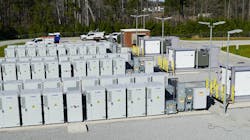Duke Energy puts 11-MW Battery System to work on NC Military site
The company claims this is the state’s largest battery system and it will be used alongside a 13-MW solar facility located on leased land at Marine Corps Base Camp Lejeune, allowing for efficient and reliable use of renewable resources.
Both sites are connected to a Duke Energy substation and can also be operated independently. The projects will serve all Duke Energy Progress customers and could be used to improve the resiliency of MCB Camp Lejeune against outages, Duke says.
The company collaborated with Black & Veatch construction entity OCI, which acted as the prime contractor for engineering, procurement, and construction. The battery system’s chemistry is lithium iron phosphate, with a capacity of 11-MW/11-MWh and a physical footprint of about one acre.
“Battery storage is an important resource for our transition to cleaner energy,” said Kendal Bowman, Duke Energy’s North Carolina State President. “Pairing the energy storage system with our existing solar facility at Camp Lejeune helps strengthen the reliability of our energy grid and makes better use of our existing solar generation.”
See our full coverage of Energy Storage's role in the Mission Critical Energy Transition
Check out our latest free Newsletter for stories on Decarbonizing the Mining Industry and more
With more Connected Grid Assets come Cybersecurity dangers: Check our webinar with Dragos
Duke has been expanding its battery storage in North Carolina in recent years, with a 9-MW lithium-ion battery system operating next to a Duke Energy substation in the Shiloh community in Asheville. In the town of Hot Springs in Madison County, the company has a 4-MW lithium-ion battery system that is part of a microgrid.
The company plans to continue investing in battery technology in the coming years, with over 1,600 MW of battery storage expected to be in service by 2029. Currently, Duke’s regulated utilities have around 90 MW of battery energy storage projects in operation in three U.S. states.
